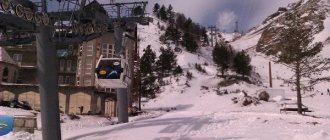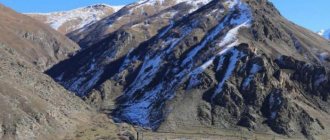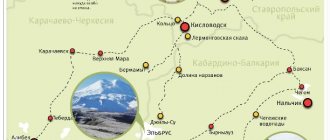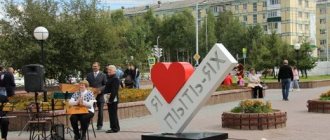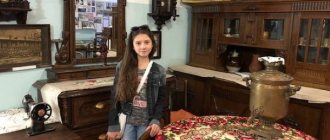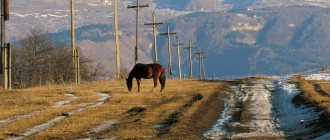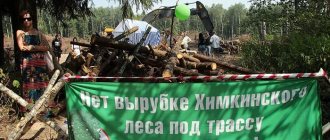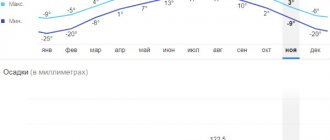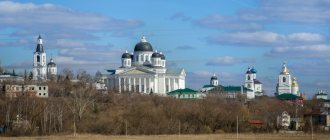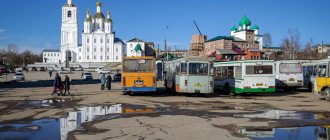| City | |
| Nartkala | |
| Kabard.-Cherk. Nartkaale | |
| 43°33′24″ n. w. 43°51′44″ E. d.HGYAO | |
| A country | Russia |
| Subject of the federation | Kabardino-Balkaria |
| Municipal district | Urvansky |
| urban settlement | Nartkala |
| Head of a city settlement | Betuganov Arsen Khazrailovich |
| History and geography | |
| Based | in 1913 |
| Former names | until 1967 - Dokshukino |
| City with | 1955 |
| Square | 9.45 km² |
| Center height | 305 m |
| Climate type | humid moderate (Dfb) |
| Timezone | UTC+3:00 |
| Population | |
| Population | ↘30,464[1] people (2021) |
| Density | 3223.7 people/km² |
| Nationalities | Kabardians, Russians, Turks, Ossetians |
| Confessions | Sunni Muslims, Orthodox, Protestants |
| Katoykonim | Nartkala residents, Nartkalinets, Nartkalinka |
| Official language | Kabardian, Balkar, Russian |
| Digital IDs | |
| Telephone code | +7 86635 |
| Postal codes | 361330—361336 |
| OKATO code | 83240501000 |
| OKTMO code | 83640101001 |
| Other | |
| Precipitation rate | 500—700/year |
| Day of the city | last Saturday in September |
| ur.adm-kbr.ru/index.php/gp-nartkala/ | |
| Nartkala Moscow Nalchik Nartkala | |
| Media files on Wikimedia Commons | |
Nartkala
(Kabard-Cherk. Nartkaale) is a city in the Urvansky district of the Kabardino-Balkarian Republic. The fourth most populous city in the republic.
Forms the municipal entity " urban settlement Nartkala"
", as the only settlement in its composition[2].
Geography
One of the central streets of the city
The city is located in the northern part of the Urvansky district, 21 km northeast of the city of Nalchik. A branch of the North Caucasus Railway passes through the city and the Dokshukino railway station operates.
It borders on the lands of settlements: Kakhun in the east, Urvan in the south, Shithala in the southwest and Morzokh in the west.
| Distance from Nartkala to major cities (by road)[3] | ||||
| NW | Baksan ~ 42 km Pyatigorsk ~ 100 km Cherkessk ~ 200 km | Maysky ~ 28 km Prokhladny ~ 38 km Mozdok ~ 90 km | NE | |
| Z | Chegem ~ 30 km Sochi ~ 670 km | Terek ~ 35 km Grozny ~ 190 km | IN | |
| S-W | Nalchik ~ 21 km Tyrnyauz ~ 100 km | Vladikavkaz ~ 110 km Magas ~ 115 km | SE | |
The settlement is located on the sloping Kabardian plain, in the transition zone from the foothills to the flat zone of the republic. The terrain is mainly undulating foothill plains, with a general slope from southwest to northeast. On the outskirts there are chains of mound hills. The average altitude in the city is about 305 meters above sea level.
The hydrographic network is mainly represented by spring outlets and small rivers. A spring river flows through the territory of the city - Belaya Rechka (Psychokh). The city’s largest body of water, Lake Komsomolskoye, is located in the central city park. In the vicinity of the city there is a large Dokshukinsky quarry filled with groundwater. There are wastewater treatment plants located on the northern outskirts of the city.
The climate in the city is humid and moderate, with warm summers and cool winters. The proximity of the Main Caucasus Range determines the climate and weather conditions of the area. The average annual air temperature is about +10.0°C and ranges from an average of +22.5°C in July to an average of -2.0°C in January. The average daily air temperature ranges from −10°С to +15°С in winter and from +16°С to +30°С in summer. The average annual precipitation is about 650 mm. The bulk of precipitation falls between April and June. The main winds are east and north-west. At the beginning of spring, with sudden changes in temperature, strong winds blow from the mountains.
Modern objects interesting to visit
The Kabardino-Balkarian city of Nartkala, during the 2011 republican competition, received the status of the best municipal formation in the region.
Modern theaters in Kabardino-Balkaria
A visit to the modern theater in Kabardino-Balkaria can be interesting and educational.
The following theaters are located near the town of Nartkala:
- Mukhadin Nagoev Public Theater;
- Kabardian Drama Theater named after K. Kuliev;
- Musical Theatre;
- Drama Theater named after Ali Shogentsukov.
Thematic exhibitions
Various thematic exhibitions are systematically organized on the territory of Nartkala. Here you can get acquainted with the latest achievements in the field of agriculture, science and fine arts. One of these exhibitions is taking place at the address: Nalchik, Lenin Avenue, building No. 17. It is open to visitors from Monday to Saturday from 10.00 to 18.00.
Billiard clubs in Kabardino-Balkaria
You can relax and have fun in billiard clubs:
| club | location address |
| Camelot | Nalchik, st. Temryuk Idarova, house No. 91 |
| Billiard room | Nalchik, st. Dagestanskaya, house No. 27 |
| Mak Auto | Nalchik, st. Lermontova, house No. 36 |
| Billiard club | Nalchik, st. Tarchokova, house No. 2 |
| Classic-7 | Nalchik, st. Tchaikovsky, house No. 36 |
Territorial division
The area of the urban settlement is 9.45 km2. Of these[4]:
| № | Purpose | Area in km2 | Share |
| 1 | Residential developments | 4,47 | 47,3 % |
| 2 | Industrial buildings | 0,91 | 9,6 % |
| 3 | Public and business buildings | 0,49 | 5,2 % |
| 4 | Transport infrastructure | 0,40 | 4,2 % |
| 5 | Recreational area | 0,21 | 2,2 % |
| 6 | Agricultural land | 0,16 | 1,7 % |
| 7 | Military and special facilities | 0,02 | 0,2 % |
| 8 | Other territorial zones | 2,79 | 29,6 % |
| 9 | Total | 9,45 | 100,0 % |
How to move around the city more conveniently
Travel around the city is provided by city buses, trolleybuses and minibuses. In total, 21 gazelle routes, 8 bus routes and 4 trolleybus routes have been approved in Nartkal. You can also use the services of a taxi car.
Nartkala is a small but cozy and well-kept city in Kabardino-Balkaria. The culture here is imbued with national flavor and established ancient traditions. The locality is an industrially developed city, which in 2008 took 1st place in the competition “Successes in the economics and finances of municipalities belonging to the 3rd category.”
Author: Olga Zhanskaya
Story
One of the city's microdistricts.
In 1913, construction of the railway connecting Nalchik and Kotlyarevskaya stations was completed. Simultaneously with the completion of the road construction, three kilometers west of the village of Nizhneye Dokshukino, a small railway station was built, at which a new settlement was founded. The new settlement and station were named Dokshukino
(Kabard-Cherk. Dokushykuey), in honor of the Dokshukins princes who owned these lands.
Initially, the new settlement consisted of one administrative building and two houses for service personnel. Since 1917, people from surrounding villages began to move to the station.
In 1920, with the final establishment of Soviet power in Kabarda, all Kabardian villages were renamed due to the presence of surnames of princely and noble families in their names. The only exception from this list was the Dokshukino station, which retained its former name. However, other villages that belonged to the princes Dokshukino and also bore the name Dokshukino
(current Old Cherek and Kakhun), were renamed like all other settlements with “princely” names.
In 1921, the station received the status of a village, which was registered as a settlement with administrative subordination to the Kakhuna Village Council.
In 1928, the village was transformed into an independent settlement, with a separate village council. From this time on, a sharp increase in the population of the village began. So, in 1929, only 160 people lived in Dokshukino, and in 1934 the population was already 2,240 people.
On November 9, 1938, Dokshukino received the status of a workers' village[5].
During the Great Patriotic War, in November 1942, the village was occupied by German troops. Released in January 1943. In memory of the fallen soldiers, several monuments have been erected in the city.
In 1944, the regional center of the Urvansky district was moved from the village of Stary Cherek to the village of Dokshukino, which contributed to the further growth of the socio-economic potential of the village.
On June 16, 1955, the village of Dokshukino received city status and, by Decree of the Presidium of the Supreme Soviet of the RSFSR, was transformed into a city of republican subordination.
In 1964, Dokshukino was transferred back from republican (ASSR) subordination to district one.
In 1967, Dokshukino was renamed Nartkala. The name “Nartkala” consists of two common Caucasian words - “ nart”
"(heroes-heroes of national epics of many Caucasian peoples) and "
kala
", which means "city". That is, “Nartkala” in translation means “city of Narts” or “city of heroes.”
Excerpt characterizing Nartkal
Suddenly, cannon shots were heard from the embankment (they were firing to commemorate peace with the Turks), and the crowd quickly rushed to the embankment to watch them shoot. Petya also wanted to run there, but the sexton, who had taken the little bark under his protection, did not let him in. The shots still continued when officers, generals, and chamberlains ran out of the Assumption Cathedral, then others came out not so hastily, the caps were taken off their heads again, and those who had run away to look at the cannons ran back. Finally, four more men in uniforms and ribbons emerged from the cathedral doors. "Hooray! Hooray! – the crowd shouted again. - Which? Which? - Petya asked around him in a crying voice, but no one answered him; everyone was too carried away, and Petya, choosing one of these four faces, whom he could not clearly see because of the tears that had come into his eyes with joy, concentrated all his delight on him, although it was not the sovereign, shouted “Hurray! in a frantic voice and decided that tomorrow, no matter what it cost him, he would be a military man. The crowd ran after the sovereign, accompanied him to the palace and began to disperse. It was already late, and Petya had not eaten anything, and sweat poured from him like hail; but he did not go home and, together with a diminished, but still quite large crowd, stood in front of the palace, during the sovereign’s dinner, looking out the palace windows, expecting something else and equally envying the dignitaries who were driving up to the porch - for the sovereign’s dinner, and the chamber lackeys who served at the table and flashed through the windows. At the Emperor’s dinner, Valuev said, looking out the window: “The people still hope to see Your Majesty.” Lunch was already over, the sovereign got up and, finishing his biscuit, went out onto the balcony. The people, with Petya in the middle, rushed to the balcony. -Angel, father! Hurray, father!.. - the people and Petya shouted, and again the women and some weaker men, including Petya, began to cry with happiness. A rather large piece of the biscuit, which the sovereign was holding in his hand, broke off and fell onto the railing of the balcony, from the railing to the ground. The driver standing closest to him in his undershirt rushed to this piece of biscuit and grabbed it. Some of the crowd rushed to the coachman. Noticing this, the sovereign ordered a plate of biscuits to be served and began throwing biscuits from the balcony. Petya's eyes became bloodshot, the danger of being crushed excited him even more, he threw himself on the biscuits. He didn’t know why, but he had to take one biscuit from the king’s hands, and he had to not give in. He rushed and knocked down an old woman who was catching a biscuit. But the old woman did not consider herself defeated, although she was lying on the ground (the old woman was catching the biscuits and did not get them with her hands). Petya knocked her hand away with his knee, grabbed the biscuit and, as if afraid of being late, again shouted “Hurray!”, in a hoarse voice. The Emperor left, and after that most of the people began to disperse. “I said that we would have to wait a little longer, and so it happened,” people said joyfully from different sides. No matter how happy Petya was, he was still sad to go home and know that all the pleasure of that day was over. From the Kremlin, Petya did not go home, but to his comrade Obolensky, who was fifteen years old and who also joined the regiment. Returning home, he resolutely and firmly announced that if they didn’t let him in, he would run away. And the next day, although he had not yet completely given up, Count Ilya Andreich went to find out how to settle Petya somewhere safer. On the morning of the 15th, the third day after this, countless carriages stood at the Slobodsky Palace. The halls were full. In the first there were noblemen in uniforms, in the second there were merchants with medals, beards and blue caftans. There was a hum and movement throughout the hall of the Noble Assembly. At one large table, under the portrait of the sovereign, the most important nobles sat on chairs with high backs; but most of the nobles walked around the hall. All the nobles, the same ones whom Pierre saw every day, either in the club or in their houses, were all in uniforms, some in Catherine’s, some in Pavlov’s, some in the new Alexander, some in the general noble, and this general character of the uniform gave something strange and fantastic to these old and young, the most diverse and familiar faces. Particularly striking were the old people, low-sighted, toothless, bald, covered in yellow fat or wrinkled and thin. For the most part, they sat in their seats and were silent, and if they walked and talked, they joined someone younger. Just like on the faces of the crowd that Petya saw in the square, on all these faces there was a striking feature of the opposite: a general expectation of something solemn and ordinary, yesterday - the Boston party, Petrushka the cook, Zinaida Dmitrievna’s health, etc. Pierre, from early In the morning, pulled together in an awkward, narrow nobleman's uniform, he was in the halls. He was excited: the extraordinary gathering of not only the nobility, but also the merchants - the estates, etats generaux - evoked in him a whole series of thoughts that had long been abandoned, but were deeply etched in his soul about the Contrat social [Social Contract] and the French Revolution. The words he noticed in the appeal that the sovereign would arrive in the capital to confer with his people confirmed him in this view. And he, believing that in this sense something important was approaching, something that he had been waiting for a long time, walked around, looked closely, listened to the conversation, but nowhere did he find the expression of the thoughts that occupied him. The sovereign's manifesto was read, which caused delight, and then everyone scattered, talking. In addition to the usual interests, Pierre heard talk about where the leaders should stand when the sovereign enters, when to give a ball to the sovereign, whether to divide into districts or the entire province... etc.; but as soon as it came to the war and what the nobility was assembled for, the talk was indecisive and uncertain. Everyone was more willing to listen than to talk. One middle-aged man, courageous, handsome, in a retired naval uniform, spoke in one of the halls, and people crowded around him. Pierre walked up to the circle that had formed around the talker and began to listen. Count Ilya Andreich in his Catherine, voivode's caftan, walking with a pleasant smile among the crowd, familiar with everyone, also approached this group and began to listen with his kind smile, as he always listened, nodding his head approvingly in agreement with the speaker. The retired sailor spoke very boldly; this was evident from the expressions of the faces listening to him, and from the fact that those known to Pierre as the most submissive and quiet people moved away from him disapprovingly or contradicted him. Pierre pushed his way into the middle of the circle, listened and became convinced that the speaker was indeed a liberal, but in a completely different sense than Pierre thought. The sailor spoke in that especially sonorous, melodious, noble baritone, with a pleasant grazing and reduction of consonants, in that voice with which one shouts: “Pipe, pipe!”, and the like. He spoke with a habit of revelry and authority in his voice. - Well, the Smolensk people offered the militia to the gosuai. Is it a decree for us from Smolensk? If the bouard nobility of the Moscow province finds it necessary, they can show their devotion to the Emperor by other means. Have we forgotten the militia in the seventh year! The revelers and thieves had just made a profit... Count Ilya Andreich, smiling sweetly, nodded his head approvingly. – So, did our militias really benefit the state? No! They just ruined our farms. It’s better to have another set... otherwise neither a soldier nor a man will return to you, and only one debauchery. The nobles do not spare their belly, we ourselves will all go, take another recruit, and all of us just call the goose call (that’s how the sovereign pronounced it), we will all die for him,” the speaker added with animation. Ilya Andreich swallowed his drool with pleasure and pushed Pierre, but Pierre also wanted to talk. He stepped forward, feeling animated, not yet knowing why and not yet knowing what he would say. He had just opened his mouth to speak when one senator, completely without teeth, with an intelligent and angry face, standing close to the speaker, interrupted Pierre. With a visible habit of leading debates and holding questions, he spoke quietly, but audibly: “I believe, dear sir,” said the senator, muttering with a toothless mouth, “that we are not called here to discuss what is more convenient for the state at the present moment.” - recruitment or militia. We are called to respond to the appeal with which the Emperor has honored us. And we will leave it to the higher authorities to judge what is more convenient - a conscription or a militia... Pierre suddenly found an outcome to his animation. He became bitter against the senator, who introduced this correctness and narrowness of views into the upcoming occupations of the nobility. Pierre stepped forward and stopped him. He himself did not know what he would say, but he began animatedly, occasionally bursting into French words and expressing himself bookishly in Russian. “Excuse me, Your Excellency,” he began (Pierre was well acquainted with this senator, but considered it necessary to address him here officially), “although I do not agree with Mr.... (Pierre paused. He wanted to say mon tres honorable preopinant), [my esteemed opponent,] - with Mr.... que je n'ai pas L'honneur de connaitre; [whom I do not have the honor to know] but I believe that the class of nobility, in addition to expressing its sympathy and admiration, is also called upon to discuss the measures by which we can help the fatherland. I believe,” he said, inspired, “that the sovereign himself would be dissatisfied if he found in us only the owners of the peasants whom we give to him, and ... the chair a canon [fodder for guns] that we make of ourselves, but I wouldn’t find any co…co… advice in us. Many moved away from the circle, noticing the senator’s contemptuous smile and the fact that Pierre spoke freely; only Ilya Andreich was pleased with Pierre’s speech, just as he was pleased with the speech of the sailor, the senator, and in general always with the speech that he last heard. “I believe that before discussing these issues,” Pierre continued, “we must ask the sovereign, most respectfully ask His Majesty to communicate to us, how many troops we have, what is the situation of our troops and armies, and then... But Pierre did not have time Having finished speaking these words, he was suddenly attacked from three sides. The one who attacked him the most was a Boston player who had known him for a long time and was always well disposed toward him, Stepan Stepanovich Apraksin. Stepan Stepanovich was in his uniform, and, whether because of the uniform or for other reasons, Pierre saw a completely different person in front of him. Stepan Stepanovich, with senile anger suddenly appearing on his face, shouted at Pierre: “Firstly, I’ll tell you that we have no right to ask the sovereign about this, and secondly, if the Russian nobility had such a right, then the sovereign cannot ask us answer. The troops move in accordance with the movements of the enemy - the troops depart and arrive... Another voice of a man of average height, about forty years old, whom Pierre had seen among the gypsies in the old days and knew to be a bad card player and who, also changed in uniform, moved closer to Pierre and interrupted Apraksina. “And this is not the time to speculate,” said the voice of this nobleman, “but we need to act: the war is in Russia.” Our enemy is coming to destroy Russia, to desecrate the graves of our fathers, to take away their wives and children. – The nobleman hit himself in the chest. “We will all get up, we will all go, all for the Tsar Father!” - he shouted, rolling his bloodshot eyes. Several approving voices were heard from the crowd. “We are Russians and will not spare our blood to defend the faith, the throne and the fatherland. But we must leave nonsense if we are sons of the fatherland. “We will show Europe how Russia is rising up for Russia,” the nobleman shouted. Pierre wanted to object, but could not say a word. He felt that the sound of his words, no matter what thought they contained, was less audible than the sound of the words of an animated nobleman. Ilya Andreich approved from behind the circle; some smartly turned their shoulders to the speaker at the end of the phrase and said: “That’s it, that’s it!” This is true! Pierre wanted to say that he was not averse to donating money, men, or himself, but that he would have to know the state of affairs in order to help him, but he could not speak. Many voices shouted and spoke together, so that Ilya Andreich did not have time to nod to everyone; and the group grew larger, broke up, came together again and all moved, buzzing with conversation, into the large hall, towards the large table. Not only was Pierre unable to speak, but he was rudely interrupted, pushed away, and turned away from him as if from a common enemy. This did not happen because they were dissatisfied with the meaning of his speech - it was forgotten after a large number of speeches that followed it - but in order to animate the crowd it was necessary to have a tangible object of love and a tangible object of hatred. Pierre was the last. Many speakers spoke after the animated nobleman, and everyone spoke in the same tone. Many spoke beautifully and originally. The publisher of the Russian Bulletin, Glinka, who was recognized (“a writer, a writer!” was heard in the crowd), said that hell should reflect hell, that he saw a child smiling in the flash of lightning and the rumble of thunder, but that we will not be this child.
Population
| Population | |||||||||
| 1939 | 1959 | 1970[6] | 1979[7] | 1989[8] | 1998[9] | 2000[9] | 2001[9] | 2002[10] | 2003[9] |
| 5400 | ↗13 100 | ↗18 958 | ↗23 419 | ↗28 171 | ↗28 800 | ↗29 000 | ↗29 100 | ↗33 775 | ↗33 800 |
| 2005[9] | 2006[9] | 2007[9] | 2008[9] | 2009[11] | 2010[12] | 2011[9] | 2012[13] | 2013[14] | 2014[15] |
| →33 800 | ↘33 600 | ↘33 500 | ↘33 400 | ↘33 362 | ↘31 694 | ↗31 700 | ↘31 325 | ↘31 037 | ↘30 500 |
| 2015[16] | 2016[17] | 2017[18] | 2018[19] | 2019[20] | 2020[21] | 2021[1] | |||
| ↘30 476 | ↗30 497 | ↗30 643 | ↗30 704 | ↗30 832 | ↘30 634 | ↘30 464 | |||
As of January 1, 2022, in terms of population, the city was in 491st place out of 1,116[22] cities of the Russian Federation[23].
Density - 3223.7 people/km2.
National composition
According to the 2010 All-Russian Population Census[24]:
| People | Number of people, people | Share of the total population, % |
| Kabardians | 20 629 | 65,09 % |
| Russians | 7 444 | 23,49 % |
| Turks | 1 233 | 3,89 % |
| Ossetians | 527 | 1,66 % |
| Ukrainians | 366 | 1,15 % |
| other | 1 495 | 4,72 % |
| Total | 31 694 | 100 % |
Sex and age composition of the population
According to the 2010 All-Russian Population Census[25]:
| Age | Men, persons | Women, persons | Total number, people | Share of the total population, % |
| 0 – 14 years | 2 842 | 2 772 | 5 614 | 17,71 % |
| 15 – 59 years | 9 964 | 11 939 | 21 903 | 69,11 % |
| from 60 years old | 1 387 | 2 790 | 4 177 | 13,18 % |
| Total | 14 193 | 17 501 | 31 694 | 100 % |
Men - 14,193 people. (44.8%). Women - 17,501 people. (55.2%)[26].
The average age of the population is 36.1 years. The median age of the population is 34.5 years.
The average age of men is 33.8 years. The median age of men is 31.8 years.
The average age of women is 37.9 years. The median age of women is 37.1 years.
Weather, best time to travel
Main Directorate of the Ministry of Internal Affairs of Russia for the Perm region
Nartkal has a humid temperate climate typical of mid-latitudes. On average, precipitation falls from 500 to 700 mm per year.
Nartkala Kabardino-Balkaria, weather by month.
Average temperatures:
| months | night °C | daytime °C | comfort rating |
| January | -5,9 | +0,8 | 4,2 |
| February | -4,6 | +2,6 | 4,2 |
| March | -0,4 | +7,7 | 4,2 |
| April | +4,2 | +14,0 | 4,5 |
| May | +9,1 | +18,9 | 4,6 |
| June | +12,9 | +22,8 | 4,7 |
| July | +15,0 | +25,2 | 4,8 |
| August | +14,6 | +25,7 | 4,9 |
| September | +10,8 | +21,2 | 5,0 |
| October | +5,8 | +14,2 | 4,5 |
| november | +0,8 | +8,3 | 4,2 |
| December | -2,8 | +4,1 | 4,2 |
Based on statistics, the most successful month to visit Nartkala is September.
Associated climatic conditions:
| month | sunny days | precipitation in mm | wind speed in m/s | rainy days |
| January | 10 | 17,43 | 1,8 | 9 |
| February | 13 | 12,80 | 2,0 | 8 |
| March | 11 | 30,91 | 2,4 | 13 |
| April | 15 | 36,99 | 2,5 | 15 |
| May | 16 | 85,68 | 2,2 | 23 |
| June | 19 | 109,08 | 2,2 | 22 |
| July | 22 | 77,86 | 2,1 | 19 |
| August | 26 | 36,38 | 2,2 | 11 |
| September | 22 | 28,12 | 2,3 | 10 |
| October | 16 | 26,56 | 2,1 | 10 |
| november | 15 | 15,11 | 1,8 | 7 |
| December | 15 | 16,00 | 1,7 | 8 |
Local government
Administration of the urban settlement of Nartkala - Nartkala city, st. Lenina, 35.
The structure of local government bodies of urban settlements is:
- The executive and administrative body is the Local Administration of the urban settlement of Nartkala. Consists of 15 people. The head of the administration of the urban settlement is acting
Betuganov Arsen Khazrailovich (
since May 26, 2022
).
- Chairman of the Local Government Council of the urban settlement - Leonid Abuzedovich Khagov ( since July 23, 2009
).
Hotels
Numerous hotels invite city guests to relax in their apartments.
Hotel Sakura
The hotel-hostel is located in Kabardino-Balkaria, in the city of Nartkala, on the street. Oshnokova, in house No. 5. The cost of a bed in a hostel starts from 2 thousand rubles. per night. The hotel-hostel offers tourists the following rooms:
- budget double room with one bed;
- budget double room with two separate beds;
- budget triple room with a double bed and an additional single bed.
The hotel offers amenities and services:
- transfer from and to the airport;
- free private parking and internet;
- minimum amount of furniture in rooms;
- individual check-in and check-out of guests;
- ironing and laundry services;
- 24-hour front desk.
The hotel rooms are equipped with air conditioning and heating. Pets are allowed by prior arrangement. The hotel has a sauna.
Hotel complex "U Illarion"
The hotel complex is located in the Kabardino-Balkarian Republic, on the territory of the Urvansky district, in the city of Nartkala, on the street. Kabardinskaya, in house No. 131. Contact phone number of the hotel complex.
The hotel complex is located near the Dokshukino railway station.
Religion
Central city mosque "Al-Iman"
The city is inhabited mainly by representatives of two faiths - Islam and Christianity.
Peoples traditionally professing Islam make up about 70-75% of the city's population. As in the republic as a whole, Muslims in the city adhere to the Hanafi legal school of Islam.
Islam
- The central cathedral mosque "Al-Iman", with a madrasah for studying the Koran, literary Arabic and writing.
Christianity
Russian Orthodox Church
- Church of St. Nicholas the Wonderworker.
Protestant churches
- Adventist Christian Church.
- Church of Evangelical Christian Baptists.
Interesting places to relax with children
On the territory of Nartkala there is entertainment for children of different ages.
Nartkala City Children's Library
The central city children's library for children is located at the address: Kabardino-Balkarian Republic, Urvansky district, Nartkala, st. Bozieva, house No. 4. Contact phone number of the children's library: +7(86635)4-24-04.
Zoo
Location of the zoo: Kabardino-Balkaria, Nalchik, Dolinsk.
The zoo is located 21 km from Nartkala. The zoo is open to visitors daily from 09.00 to 18.00. Contact numbers and. The zoo contains a huge variety of animal species.
In addition, the territory of the zoo is planted with unique plants that can only grow in such a climate. For small children there are playgrounds, swings and sandboxes. For adult visitors, there are recreation areas with benches.
Entertainment centers of Kabardino-Balkaria
For children of all ages, relaxation in numerous entertainment centers located near the city of Nartkala is perfect:
| Name | address | Contact phone numbers | opening hours |
| "El Toro" | Nalchik, st. Golovko, house No. 103 | +7(8662)74-32-32, | daily, around the clock |
| TRC "Deya" | Nalchik, st. Kirova, house No. 120 | +7(8662)96-83-59 | Every day, from 09.00 to 00.00. |
| "Megapolis" in the shopping mall Gallery | Nalchik, st. Kirova, house No. 1 "d" | +7(8662)42-90-59 | Every day, from 11.00 am to 00.00 am. |
| Nalchik, st. Shortanova, house No. 14 “a” | +7(8662)40-01-73, | Every day, from 10.00 to 22.00. |
Education
View of the Main Caucasus Range from the city side Municipal educational institutions in the city
| Educational institution | Type of institution | Address |
| MKOU Lyceum No. 1 | average | st. Kabardinskaya, 115 |
| MKOU secondary school No. 2 | average | st. Kabardinskaya, 131 |
| MKOU secondary school No. 3 | average | st. Vatutina, 1 |
| MKOU secondary school No. 4 | average | st. Gurfova, 2 |
| MKOU secondary school No. 5 | average | st. Pushkina, 46 |
| MKOU secondary school No. 6 | average | st. Zhamborova, 76 |
| Kindergarten No. 2 “Cinderella” | preschool | st. Gurfova, 27 |
| Kindergarten No. 5 “Oshkhamakho” | preschool | st. Yubileinaya, 17 |
| Kindergarten No. 9 “Thumbelina” | preschool | st. Koshevogo, 9a |
| Kindergarten No. 14 “Firefly” | preschool | st. Michurina, 2 |
| Kindergarten No. 35 “Nur” | preschool | st. Pushkina, 48 |
Where to eat
You can eat in numerous cafes located throughout the city.
Armada King
The cafe is located in Nartkala, on the street. Kabardinskaya, in house No. 133. The average bill in a cafe is from 200 to 250 rubles. American and Greek cuisine is served here. It is possible to take coffee with you and sit on the summer veranda.
Cafe "Caprice"
The cafe is located in Nartkal. The cafe's opening hours are from 10.00 to 00.00. Latin American cuisine is served here. The average bill in a cafe is from 600 to 1600 rubles.
Sushi bar
The sushi bar is open from 11.00 to 22.00. It is located in Kabardino-Balkaria, in Nartkal, on the street. Akhmetova. The cafe serves Japanese cuisine.
"Marrakesh"
The cafe's opening hours are from 11.00 a.m. to 00.00 a.m. The cafe is located at: Kabardino-Balkaria, Nartkala, st. Kabardinskaya, house No. 74. The average bill in a cafe is 600 rubles. The cafe serves mixed and European cuisine. The cafe allows you to pay by card.
Pizzeria "Picola Italia"
The pizzeria is located in Nartkala, on the street. Kakhunskaya, in house No. 54 “a”. The average bill in a pizzeria is from 190 to 320 rubles. The pizzeria is open from 11.00 to 21.00.
Culture
View of the central city park Cultural institutions
- City Palace of Culture
- City Library
- Museum of History and Local Lore
Socio-political organizations
- Adyghe Khase
- Council of Veterans of the Great Patriotic War
- Council of Labor Veterans, etc.
Mass media
- A private television[27] is based in the city, which broadcasts in Urvansky and other regions of the republic.
- The regional newspaper “Mayak-07” is published and circulated in the Urvansky district.
Gallery
Central city mosque | Monument to the fallen in the Second World War | Argo Enterprise | City Central Park | the main street |
Notes[edit | edit code]
- ↑. Access date: October 17, 2022.
- (unavailable link).
- .
- . Demoscope Weekly. Access date: September 25, 2013.
- . Demoscope Weekly. Access date: September 25, 2013.
- .
- ↑
- .
- . Access date: January 2, 2014.
- (unavailable link). Access date: September 21, 2014.
- . Access date: May 31, 2014.
- . Access date: November 16, 2013.
- . Date accessed: August 2, 2014.
- . Date accessed: August 6, 2015.
- (October 5, 2018). Access date: May 15, 2022.
- (July 31, 2017). Access date: July 31, 2022.
- . Access date: July 25, 2022.
- . Access date: July 31, 2022.
- taking into account the cities of Crimea
- (RAR archive (1.0 MB)). Federal State Statistics Service
. - (unavailable link). Date accessed: May 19, 2022.
- (unavailable link). Date accessed: May 19, 2022.
- (unavailable link). Access date: June 16, 2016.
- .
- (unavailable link). Access date: April 14, 2014.
- (August 12, 2016). Access date: August 12, 2016.
Detailed map of Nartkala with streets and house numbers
the city of Nartkala is part of the Urvansky District, Republic of Kabardino-Balkaria, Russian Federation.
Satellite map of Nartkala
Pay attention to the map of Nartkala in the upper right corner, there is a layers button, to view the map of Nartkala from a satellite, select the satellite layer, and you can also choose: scheme, hybrid, folk map and folk + satellite, thus viewing the online map of Nartkala in any form . Other buttons: map in full screen and on the left in the middle two buttons + and - for zooming
Streets in the city of Nartkale
- street 50 years of Victory
- passage 9th
- ABZ street
- Abkhazskaya street
- Argudanskaya street
- Akhmetov street M.Kh.
- Balkarskaya street
- Balkizova street
- Bozieva street
- Borukaeva street
- Borukaeva street
- Vatutina street
- Gagarin street
- Gorkogo Street
- Gorky Lane
- Griboyedov street
- Gromova street
- Gruzinskaya street
- Gukepsheva street
- Gurfova street
- Dagestanskaya street
- Derbentskaya street
- Dzerzhinsky Street
- Druzhby street
- Lane of Friendship
- Zhamborova street
- Zarechnaya street
- Ivanova street
- Kabardinskaya street
- Kalinina street
- Kandokhova street
- Kankosheva street
- Kakhunskaya street
- Kirova street
- Kolkhoznaya street
- Komarova street
- Comintern street
- Kommunalnaya street
- Komsomolskaya street
- Kosmodemyanskaya street
- Koshevogo street
- Red Street
- Krasnoarmeyskaya street
- Krupskaya street
- Krylova street
- Kuasheva street
- Lenin Street
- Lermontova street
- Lomonosova street
- Luxembourg street
- Luxembourg street
- Massaeva street
- Matrosova street
- Mayakovsky street
- Mira street
- Michurin street
- Molodezhnaya street
- NKZ street
- Nogmova street
- Oktyabrskaya street
- Ordzhonikidze street
- Orehovaya street
- Osetinskaya street
- Osipenko street
- Oshnokova street
- Parkovaya street
- Pacheva street
- Pervomaiskaya street
- Pionerskaya street
- Pochtovy Lane
- Proletarskaya street
- Pushkin street
- Repin street
- Rodnikovy Lane
- Sadovaya street
- Sverdlova street
- Freedom Street
- North street
- Sovetskaya street
- Stepnaya street
- Stroitelnaya street
- Stroitelny Lane
- Suvorov street
- Tarchokova street
- Telman Lane
- Temirzhanova street
- Tereshkova street
- Terskaya street
- Timiryazeva street
- Tolstoy street
- narrow lane
- Urvanskaya street
- Fadeeva street
- Frunze street
- Khavpacheva street
- Halishkhova street
- Khasanova street
- Khasanova Lane
- Chapaeva street
- Cherkesskaya street
- Chekhov street
- Chkalova street
- Shevlokov street
- Shevlokov street
- Shevchenko street
- Shekikhacheva street
- Shkolnaya Street
- Shogentsukov Lane
- Shogentsukova street
- Shchors Street
- Elbrusskaya street
- Yubileinaya street
- South street
- Yahogoeva Lane
- Yahogoeva street
Look at other maps: Psynabo streets on the map, map of Urukh with streets and house numbers
